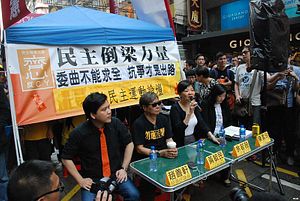On Friday, voting opened in Hong Kong on three different proposals for the future direct elections of Hong Kong’s chief executive. The unofficial referendum is part of the Occupy Central Movement, which protests what it sees as unfair restrictions Beijing is placing on Hong Kong democracy. According to Occupy Central organizers cited by the South China Moring Post, over 420,000 people had voted between 12 p.m. on Friday (when the poll opened) and 1 a.m. on Saturday.
The votes cast so far came despite intense cyber attacks on the online voting platform. Matthew Prince, the head of the company providing technical support for the voting platform, said on Twitter that distributed denial-of-service attacks were coming in at a rate of 300 gigabits per second. He also said that the attack had been expected. All voting so far has been online, but physical polling stations will open on June 22. Voting will continue until June 29. After the voting ends, the movement will live up to its name by “occupying” Hong Kong’s Central district.
Both Hong Kong and Beijing officials have denounced the referendum. In Beijing, State Council representative called the referendum “illegal and invalid,” The New York Times reported. Hong Kong Chief Executive Leung Chun-ying told reporters on Friday that none of the three proposals included on the referendum was in compliance with Hong Kong’s Basic Law. A Hong Kong government spokesperson quoted by SCMP explained that all of the proposals would allow for public nomination of candidates for chief executive, while the Basic Law reserves the right of nominations to a committee. The spokesperson called the idea of direct nominations “legally highly controversial” and unlikely to be politically feasible.
Beijing has not been shy about denouncing the referendum. At the same time, the Chinese Communist Party (CCP) has been busy promoting its vision of “one country, two systems.” Last week, the State Council’s Information Office released a white paper detailing the “comprehensive and correct understanding and implementation of the policy.” The bottom line was that Hong Kong’s autonomy is a privilege, not a right. As such, Beijing will not back down on its requirement that all candidates for Hong Kong’s chief executive must be CCP-approved “patriots.”
In addition, People’s Daily has published two back-to-back front page articles on “correctly” understanding Hong Kong’s relationship with the mainland, presumably in preparation for the unofficial referendum’s opening today. Thursday’s commentary reiterated the points made in the white paper, noting that Hong Kong’s Basic Law should not be understood as a “constitution” as it remains subordinate to the Chinese constitution (which gives all ultimate authority to the CCP). People’s Daily denounced those who wanted to make Hong Kong “independent or half-independent.”
Today’s piece offered a slightly different tone, emphasizing that Hong Kong’s future prosperity and development depend on its good relationship with the mainland. This article highlighted the need for positive relations between Hong Kong and Beijing, noting that the CCP helped Hong Kong through tough times from the 1998 Asian financial storm to the 2003 SARS outbreak and 2008’s global financial crisis. Hong Kong’s continued prosperity, the article argued, can only be guaranteed by deepening cooperation with the mainland and its massive market. Friday’s article also touched on the importance of having Hongkongers socially identify as Chinese.
This is a hard sell right now — a poll from earlier this year found that 52 percent of permanent Hong Kong residents are upset with the way Beijing is handling Hong Kong. The number of dissatisfied Hongkongers jumps to 82 percent in the 21-29 age bracket. Long-term, this dissatisfaction will pose a greater challenge to Beijing than this week’s referendum, which doesn’t even have the full support of Hong Kong’s pro-democracy advocates.

































